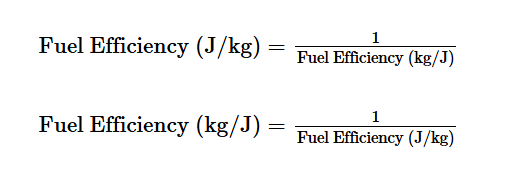Fuel Efficiency Converter - kg/J to J/kg Calculator
How to Convert Fuel Efficiency
The Fuel Efficiency Converter calculates the equivalent fuel efficiency between kilogram per joule (kg/J) and joule per kilogram (J/kg) using the following conversion factors:
From kg/J to J/kg:
\( \text{Fuel Efficiency (J/kg)} = \frac{1}{\text{Fuel Efficiency (kg/J)}} \)
From J/kg to kg/J:
\( \text{Fuel Efficiency (kg/J)} = \frac{1}{\text{Fuel Efficiency (J/kg)}} \)
Where:
- \( \text{kg/J} \): Kilogram per joule, a unit of fuel efficiency by mass, representing mass per unit energy, used in specific scientific contexts.
- \( \text{J/kg} \): Joule per kilogram, a metric unit used in scientific and engineering applications to measure energy per unit mass.
Enter the fuel efficiency value and select the unit to convert between kg/J and J/kg. Note: Zero values will result in zero output to avoid division by zero.
Using the Fuel Efficiency Converter
This converter is designed to assist with converting fuel efficiency between kg/J and J/kg, useful in fields like thermodynamics, energy engineering, and material science.
Input the fuel efficiency value and select the unit (kg/J or J/kg). The calculator will display the converted values in both units.
Example: Convert 2 kg/J to J/kg.
- Fuel Efficiency: \( 2 \, \text{kg/J} \)
- Conversion: \( \frac{1}{2} = 0.5 \, \text{J/kg} \)
- Result: \( 2 \, \text{kg/J} = 0.5 \, \text{J/kg} \)
Use this tool for quick and accurate conversions in scientific and engineering applications.
Common Conversion Table
The following table provides quick reference conversions for common fuel efficiency values between kg/J and J/kg:
| kg/J |
J/kg |
| 0.5 |
2 |
| 1 |
1 |
| 2 |
0.5 |
| 5 |
0.2 |
| 10 |
0.1 |
Use this table for quick lookups or to verify calculator results.
Common FAQ
Below are frequently asked questions about fuel efficiency conversions between kg/J and J/kg:
- Q: What is the difference between kg/J and J/kg?
A: kg/J (kilogram per joule) measures mass per unit energy, while J/kg (joule per kilogram) measures energy per unit mass. They are reciprocal units, so 1 kg/J = 1 / (J/kg).
- Q: Why convert between kg/J and J/kg?
A: Conversions are needed in fields like thermodynamics and material science, where kg/J may describe fuel efficiency in terms of mass per energy, and J/kg is standard for energy per mass.
- Q: How accurate is this converter?
A: The converter uses the exact reciprocal relationship (1 kg/J = 1 J/kg) and provides results rounded to 6 decimal places for kg/J and 5 for J/kg, ensuring high accuracy.
- Q: Can negative values be converted?
A: Yes, the converter handles negative values, which may be relevant in specific scientific contexts, and performs conversions accurately.
- Q: What happens if I enter zero?
A: Entering zero will result in a zero output to avoid division by zero, as the conversion involves taking the reciprocal.
 Home
Home
 Back
Back
